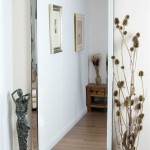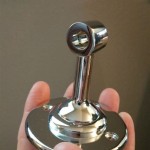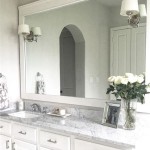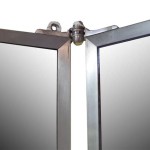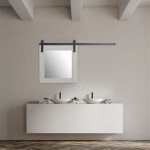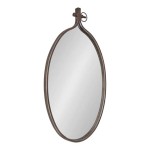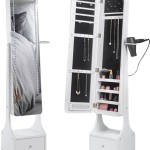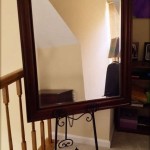Can a Mirror Be Placed in Front of a Bed?
The placement of mirrors in bedrooms, particularly in front of the bed, has been a topic of discussion across various cultures and belief systems. While some consider it aesthetically pleasing, others hold strong reservations due to perceived negative impacts on sleep and well-being. This article explores the multifaceted perspectives surrounding this practice, examining the cultural beliefs, scientific reasoning, and practical considerations involved.
Cultural Beliefs and Superstitions
Many cultures harbor traditional beliefs regarding mirrors and their placement within the home. Feng Shui, a Chinese philosophical system of harmonizing individuals with their surrounding environment, advises against placing a mirror directly facing the bed. According to this ancient practice, mirrors can amplify energy, potentially disrupting the flow of chi, or life force, in the bedroom, leading to restless sleep or negative dreams. The reflection of the sleeping body is thought to invite a third party into the marital relationship, symbolizing infidelity or attracting unwanted spirits. Similarly, some Japanese traditions associate mirrors with doorways to the spirit world, believing that placing them opposite the bed can attract malevolent entities. These beliefs, deeply ingrained in cultural contexts, often influence individuals' decisions regarding mirror placement, regardless of personal experiences.
Scientific Perspectives on Sleep and Mirrors
While cultural beliefs provide a rich tapestry of interpretations, scientific inquiry offers a different lens through which to examine the impact of mirrors on sleep. One primary concern is the potential for light reflection. Even a slight amount of ambient light reflected by the mirror can disrupt the production of melatonin, a hormone crucial for regulating the sleep-wake cycle. This disruption can lead to difficulty falling asleep, fragmented sleep throughout the night, and daytime fatigue. Additionally, the sudden awareness of one's reflection upon waking, particularly in a dimly lit room, can be startling and contribute to anxiety or a sense of unease, further impacting the quality of rest.
Another scientific aspect to consider is the phenomenon of hypnagogic hallucinations. These hallucinations, often visual or auditory, occur during the transition between wakefulness and sleep. Seeing one's reflection in a mirror during this transitional phase can exacerbate these hallucinations, making them more vivid and potentially disturbing. While hypnagogic hallucinations are typically harmless, they can be unsettling for some individuals, leading to anxiety and further sleep disruption. Therefore, from a scientific standpoint, minimizing potential light disruptions and reducing the likelihood of unsettling visual experiences are key factors to consider when deciding on mirror placement in the bedroom.
Practical Considerations for Bedroom Design
Beyond cultural beliefs and scientific perspectives, practical design considerations also play a role in the decision-making process. The size and position of the mirror, the layout of the bedroom, and the individual's personal preferences all contribute to the overall impact. A large mirror directly facing the bed can create a sense of spaciousness in a small room, reflecting light and visually expanding the area. However, this same mirror might feel overwhelming or intrusive in a larger room. The angle of the mirror can also influence its impact. A mirror placed at an angle to the bed may still reflect light but be less likely to cause direct reflections that disrupt sleep. Ultimately, personal preference and the overall aesthetic of the room should be considered alongside cultural and scientific factors when deciding on the placement of mirrors in the bedroom.
Furthermore, the individual’s psychological response to mirrors should be taken into account. Some individuals find mirrors comforting or aesthetically pleasing, while others may experience anxiety or discomfort when confronted with their reflection, particularly in vulnerable states such as waking up or preparing for sleep. Understanding these individual reactions is crucial for creating a bedroom environment that promotes relaxation and restful sleep.
Alternatives to Placing a Mirror in Front of the Bed
For those concerned about the potential negative effects of facing a mirror while sleeping, several alternative placements can be considered. Positioning the mirror on a side wall, inside a closet door, or using a freestanding mirror that can be covered or moved easily are all viable options. These alternatives allow for the functionality and aesthetic benefits of a mirror in the bedroom without the potential disruptions to sleep and well-being often associated with placing it directly opposite the bed.
Best Mirror Position In Bedroom As Per Vastu Designcafe
Vastu Tips For Mirror Placement In Bedrooms
5 Reasons Why You Should Never Put A Mirror Facing The Bed Melanie Jade Design
Vastu Tips For Mirror Placement In Bedrooms
Is It Bad To Sleep With A Mirror In Front Of Your Bed Myth Or Fact Homevib
Is It Bad To Sleep With A Mirror In Front Of Your Bed Myth Or Fact Homevib
Best Mirror Position In Bedroom As Per Vastu Designcafe
Best Mirror Position In Bedroom As Per Vastu Designcafe
Vastu Tips For Mirror Placement In Bedrooms
In Vastu Myth Or Fact Sleeping Front Of A Mirror Better Sleep

